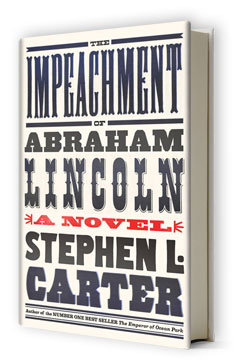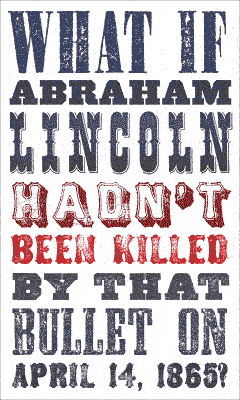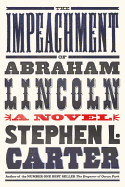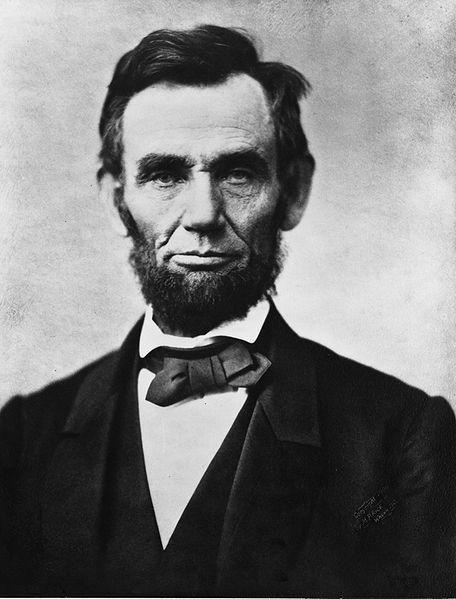The Impeachment of Abraham Lincoln
by Stephen L. Carter
There has long been a fascination with what American history would have been like had the South won the Civil War. A number of novels and histories have explored this speculation, notably MacKinlay Kantor's novel If the South Had Won the Civil War. Add to this list The Impeachment of Abraham Lincoln from Stephen L. Carter, Yale law professor and bestselling novelist (The Emperor of Ocean Park). However, Carter's fictional foray into the debate takes a different tack--the Union wins, but at a great cost. Andrew Johnson is dead and Secretary of State William Seward gravely injured. President Lincoln has survived Booth's bullet, only to be impeached for offenses he committed to protect the United States.
Carter's story begins in February 1867. A young black woman, Abigail Canner, recent graduate of Oberlin, arrives at the law offices of Dennard & McShane (the firm Lincoln has hired to defend him), where she has just been hired as a clerk and where she hopes to study the law (at a time when you could count on one hand the number of male black lawyers in America). She's intelligent, ambitious and attractive. She's frustrated daily by the menial tasks she is given, but she is "here," in this "momentous time, near enough to the center of things that she fancied she could feel the throbbing excitement of the nation's leaders as, day by day, the possibilities for Lincoln's survival waxed and waned." Abigail is a creation of Carter's, but many of the characters in the novel are historical figures.
The trial is to begin in a few months and the firm is busy trying to put its case together when news arrives that Arthur McShane has been found murdered, "sliced up," outside a colored brothel, along with a young colored woman, Rebecca Deveaux. Inspector Varack is on the case, and he's making their preparations more difficult with his inquiries. Everyone says that McShane would never frequent such a place. Why was he there? Who wanted him dead?
Carter's novel now begins to twist and turn, as new characters are introduced, side plots unearthed and various conspiracies wind their way through the story. There's David Grafton, the "crooked man," who used to work for the firm, and Jonathan Hilliman, a clerk at the firm who is becoming more and more attracted to Abigail. Add to them Seward, Edwin Stanton (the "real" Andrew Johnson's attempt to dismiss him led to Johnson's impeachment), Charles Sumner and Dan Sickles, Lincoln's confidant, a former Union General and congressman who "got away with murder" when he shot Francis Scott Key's son over a marital dispute. And then there's Lincoln, a president trying to hold a fragile Union together while defending himself against the Radicals who want him impeached. Carter presents him as wise and shrewd, a man fond of telling simple anecdotes that carry much meaning.
What started out as an historical novel suddenly takes on all the intricacies of a Grisham- or Turow-like legal thriller, along with the dark and brooding atmosphere and multitudinous characters of a Dickensian mystery, with Abigail, now known more as that "obstreperous negress," as unwilling sleuth. That Carter can juggle all these genres simultaneously in this ambitious undertaking without any one falling and breaking is a testament to his storytelling skills.
Looming in the background is Washington City itself, with its population of 100,000, nearly one-half of which is colored. Part refined and wealthy, part White House, Congress and government, and part poor and destitute, it's a city divided, much like the country. Carter skillfully moves us from "world" to "world," carefully threading together the tale through the actions of a huge cast of characters.
Rumors spread about a mysterious letter Lincoln personally penned authorizing a military coup d'etat as the trial begins, with Chief Justice Chase presiding. In the House, Congressman Thaddeus Stevens accuses Lincoln of being the "greatest tyrant the nation has ever known." The president has failed his country and its people in terrible ways: suspending habeus corpus, censoring newspapers and seizing private telegrams, failing to protect freedmen, plotting to overthrow the Congress. And word is out now that Lincoln's loyal friend, Secretary of War Stanton, will testify against him! Meanwhile, Lincoln's legal team and friends focus on the senators, every day working the numbers, trying to reach that magical one-third that can preserve his presidency, even as the Radicals admit new states into the Union, each with two new votes against Lincoln. Carter puts his legal experience to good use as he beautifully dramatizes the suspenseful ins and outs of the trial, with its legal twists and its revelations.
Questions abound: Will Lincoln be impeached? Who killed McShane and Deveaux, and why? Does the damning letter exist? What role does Judith, Abigail's sister, who knows Deveaux, play in this story, and is her brother, Michael, involved somehow? And the late Mrs. Lincoln--how is she a factor, or Lincoln's private secretary, Noah Brooks? Carter has set himself quite the challenge to pull together all these loose threads, but knit them he does, in a masterful way, into a powerful and surprising conclusion. --Tom Lavoie








 In the end, did your feelings for Lincoln or other historical figures at that time change?
In the end, did your feelings for Lincoln or other historical figures at that time change?